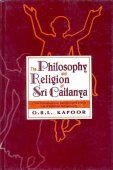Acintya, Acimtya, Ācintya: 22 definitions
Introduction:
Acintya means something in Buddhism, Pali, Hinduism, Sanskrit, Jainism, Prakrit, Marathi. If you want to know the exact meaning, history, etymology or English translation of this term then check out the descriptions on this page. Add your comment or reference to a book if you want to contribute to this summary article.
Alternative spellings of this word include Achintya.
Images (photo gallery)
In Hinduism
Vaishnavism (Vaishava dharma)
Source: Pure Bhakti: Bhagavad-gita (4th edition)Acintya (अचिन्त्य) refers to “inconceivable”. (cf. Glossary page from Śrīmad-Bhagavad-Gītā).

Vaishnava (वैष्णव, vaiṣṇava) or vaishnavism (vaiṣṇavism) represents a tradition of Hinduism worshipping Vishnu as the supreme Lord. Similar to the Shaktism and Shaivism traditions, Vaishnavism also developed as an individual movement, famous for its exposition of the dashavatara (‘ten avatars of Vishnu’).
Shaktism (Shakta philosophy)
Source: Google Books: ManthanabhairavatantramAcintya (अचिन्त्य) means “inconceivable” (e.g., moving quickly by means of the ‘inconceivable’ pulse), according to the Manthānabhairavatantra, a vast sprawling work that belongs to a corpus of Tantric texts concerned with the worship of the goddess Kubjikā.—Accordingly, “By means of the path of the teachings of the master, Śiva’s energy is in the abode of Kula. By means of the three triple modalities, she moves along the three paths (of the Triangle). (She is) Kālī, Katyāyinī, Kākī, Kulālī and Siddhayoginī and moves facing downwards in the Wheel of the Void Beyond the Fourth. She moves spontaneously very quickly (tvarita) solely by means of the inconceivable pulse [i.e, acintya-spanda] (of her own energy). Thus she is called Tvaritā (the Speedy One), the Yoginī of the Śrīkula born of the Self”.

Shakta (शाक्त, śākta) or Shaktism (śāktism) represents a tradition of Hinduism where the Goddess (Devi) is revered and worshipped. Shakta literature includes a range of scriptures, including various Agamas and Tantras, although its roots may be traced back to the Vedas.
Yoga (school of philosophy)
Source: ORA: Amanaska (king of all yogas): A Critical Edition and Annotated Translation by Jason BirchAcintya (अचिन्त्य) refers to “that which is inconceivable” (as opposed to Cintya—‘conceivable’), according to the Sarvajñānottara verse 20.34-39.—Accordingly, while discussing the culmination of detachment (for the process of attaining the no-mind state): “[...] Having established his state in that which is free of all states, he makes his state supportless. Having made the mind no-mind, he thinks of nothing whatsoever. He should meditate on the self [as] neither conceivable (cintya) nor inconceivable (acintya) and [as] both. He knows the self to be free from all partialities. [...]”.

Yoga is originally considered a branch of Hindu philosophy (astika), but both ancient and modern Yoga combine the physical, mental and spiritual. Yoga teaches various physical techniques also known as āsanas (postures), used for various purposes (eg., meditation, contemplation, relaxation).
General definition (in Hinduism)
Source: Wisdom Library: HinduismSanskrit word for "inconceivable, incomprehensible, unthinkable; surpassing thought, beyond thought"
Source: WikiPedia: HinduismAcintya is the supreme god of Indonesian Hinduism, especially on the island of Bali. He is equivalent to the concept of Brahman, and is the Supreme God in traditional wayang (shadow puppet) theatre. He is also known to most modern Balinese as Sang Hyang Widhi Wasa, also Sanghyang Widi Wasa (the "All-In-One God"), a concept introduced by Dang Hyang Dwijendra.
etymology: Acintya, also Atintya (Sanskrit: "the unthinkable", "the inconceivable", "he who cannot be imagined"), also Tunggal (Balinese: "Unity")
In Buddhism
Mahayana (major branch of Buddhism)
Source: Wisdom Library: Maha Prajnaparamita SastraAcintya (अचिन्त्य) refers to five “incomprehensible” things, according to the 2nd century Mahāprajñāpāramitāśāstra chapter XLVII.—Accordingly, “there are five incomprehensible (acintya) things, namely: i) the number of beings; ii) the retribution of action (karmavipāka); iii) the power of a person in meditation (dhyāyabala); iv) the power of the Nāgas; v) the power of the Buddha. Of these five incomprehensible things, the power of the Buddha is the most incomprehensible. The Bodhisattva in profound concentrations (gambhīra-samādhi) produces incomprehensible superknowledges (acintya-abhijñā) and by means of them, in a single moment, goes everywhere in the Buddha universes of the ten directions”.
Source: academia.edu: A Study and Translation of the GaganagañjaparipṛcchāAcintya (अचिन्त्य) refers to “(that which is) not imagined”, according to the Gaganagañjaparipṛcchā: the eighth chapter of the Mahāsaṃnipāta (a collection of Mahāyāna Buddhist Sūtras).—Accordingly, “Then, the Lord went on to speak these verses: ‘[...] (44) Action (karma), which is neither created (akṛta) nor imagined (acintya) and which is thus not discriminated (akalpita), does not have any form (rūpa) or color (varṇa) such as red, blue, and yellow. [...]’”.

Mahayana (महायान, mahāyāna) is a major branch of Buddhism focusing on the path of a Bodhisattva (spiritual aspirants/ enlightened beings). Extant literature is vast and primarely composed in the Sanskrit language. There are many sūtras of which some of the earliest are the various Prajñāpāramitā sūtras.
Buddhist philosophy
Source: Google Books: The Treasury of Knowledge: Book six, parts one and two (philosophy)Acintya (अचिन्त्य) refers to the “inconceivable (expanse),” and represents one of the nine aspects of the “consummate nature” (pariniṣpanna), which represents one of the five parts of the “three natures” (trilakṣaṇa), according to Khewang Yeshe Gyatso, Exegetical Memorandum, chapter 7 (Cf. Śatasāhasrikāprajñāpāramitā).—The term “consummate nature” (pariniṣpanna) refers to the actual reality of all phenomena, the original ultimate [truth]. [...] The consummate nature also has nine further aspects [e.g., acintya-dhātu], as is stated in the Extensive Mother (Yum rgyas pa).
-
In Jainism
General definition (in Jainism)
Source: The University of Sydney: A study of the Twelve ReflectionsAcintya (अचिन्त्य) refers to the “inconceivable” (power of the self), according to the 11th century Jñānārṇava, a treatise on Jain Yoga in roughly 2200 Sanskrit verses composed by Śubhacandra.—Accordingly, “Who is able to explain the inconceivable (acintya) power of this [self]? And that [power] is from traversing the path of meditation which is of various kinds”.

Jainism is an Indian religion of Dharma whose doctrine revolves around harmlessness (ahimsa) towards every living being. The two major branches (Digambara and Svetambara) of Jainism stimulate self-control (or, shramana, ‘self-reliance’) and spiritual development through a path of peace for the soul to progess to the ultimate goal.
Languages of India and abroad
Marathi-English dictionary
Source: DDSA: The Molesworth Marathi and English Dictionaryacintya (अचिंत्य).—a S Inconceivable, unimaginable, unfancyable.
Source: DDSA: The Aryabhusan school dictionary, Marathi-Englishacintya (अचिंत्य).—a Inconceivable.
Marathi is an Indo-European language having over 70 million native speakers people in (predominantly) Maharashtra India. Marathi, like many other Indo-Aryan languages, evolved from early forms of Prakrit, which itself is a subset of Sanskrit, one of the most ancient languages of the world.
Sanskrit dictionary
Source: DDSA: The practical Sanskrit-English dictionaryAcintya (अचिन्त्य).—a. [na. ta.] Inconceivable, incomprehensible, unexpected; °यस्तु तव प्रभावः (yastu tava prabhāvaḥ) R.5.33; °न्त्यरूप, °कर्मन् (ntyarūpa, °karman) of inconceivable form or action.
-ntyaḥ 1 Śiva.
2) Quick-silver (Nighaṇṭuratnākara).
See also (synonyms): acintanīya.
Source: Cologne Digital Sanskrit Dictionaries: Edgerton Buddhist Hybrid Sanskrit DictionaryAcintya (अचिन्त्य).—nt., a very high number: Mahāvyutpatti 7814; 7946 (here cited from Gaṇḍavyūha); 8047; Sukhāvatīvyūha 31.3; Gaṇḍavyūha 106.24; 134.13.
Source: Cologne Digital Sanskrit Dictionaries: Shabda-Sagara Sanskrit-English DictionaryAcintya (अचिन्त्य).—mfn.
(-ntya-ntyā-ntyaṃ) Inconceivable, unimaginable, incomprehensible. E. a neg. cintya conceivable.
Source: Cologne Digital Sanskrit Dictionaries: Cappeller Sanskrit-English DictionaryAcintya (अचिन्त्य).—[adjective] incomprehensible.
Source: Cologne Digital Sanskrit Dictionaries: Monier-Williams Sanskrit-English Dictionary1) Acintya (अचिन्त्य):—[=a-cintya] [from a-cintā] mfn. inconceivable, surpassing thought, [Maitrāyaṇī-saṃhitā etc.]
2) [v.s. ...] m. Name of Śiva.
Source: Cologne Digital Sanskrit Dictionaries: Goldstücker Sanskrit-English DictionaryAcintya (अचिन्त्य):—[tatpurusha compound] I. m. f. n.
(-ntyaḥ-ntyā-ntyam) Inconceivable, unimaginable, incomprehensible. Ii. m.
(-ntyaḥ) A name of Śiva. E. a neg. and cintya.
Source: Cologne Digital Sanskrit Dictionaries: Yates Sanskrit-English DictionaryAcintya (अचिन्त्य):—[a-cintya] (ntyaḥ-ntyā-ntyaṃ) a. Inconceivable, incomprehensible.
Source: DDSA: Paia-sadda-mahannavo; a comprehensive Prakrit Hindi dictionary (S)Acintya (अचिन्त्य) in the Sanskrit language is related to the Prakrit word: Aciṃta.
[Sanskrit to German]
Sanskrit, also spelled संस्कृतम् (saṃskṛtam), is an ancient language of India commonly seen as the grandmother of the Indo-European language family (even English!). Closely allied with Prakrit and Pali, Sanskrit is more exhaustive in both grammar and terms and has the most extensive collection of literature in the world, greatly surpassing its sister-languages Greek and Latin.
Kannada-English dictionary
Source: Alar: Kannada-English corpusAciṃtya (ಅಚಿಂತ್ಯ):—[adjective] not conceivable; inconceivable; unimaginable; being beyond imagination; inexplicable.
--- OR ---
Aciṃtya (ಅಚಿಂತ್ಯ):—
1) [noun] the Supreme, who cannot, in its entirety, be conceived by human mind.
2) [noun] mercury, the heavy, silver-white, toxic metallic element.
3) [noun] a number, one followed by thirty one zeros.
4) [noun] one of the eight types of strokes in mace fight.
Kannada is a Dravidian language (as opposed to the Indo-European language family) mainly spoken in the southwestern region of India.
See also (Relevant definitions)
Starts with (+2): Acintyabhedabhedatattva, Acintyadharma, Acintyadhatu, Acintyagunanuttaradharmagocara, Acintyajnana, Acintyaka, Acintyakarman, Acintyaparakrama, Acintyaparivarta, Acintyaratna, Acintyartha, Acintyarthagarbha, Acintyarupa, Acintyashakti, Acintyashri, Acintyatman, Acintyavidhananda, Acintyavidhuka, Acintyavimoksha, Acintyavirya.
Ends with: Apracimtya, Divyacintya, Pracintya.
Full-text (+18): Acinta, Acintaniya, Cintya, Acimtya, Acintyakarman, Acintyarupa, Buddhavishaya, Achinty, Karmavishaya, Dhyanavishaya, Nagavishaya, Acinti, Acintam, Acintyavyakta, Acintyaka, Avacintam, Acintiyam, Acintyaparivarta, Acintiya, Tathagatagunajnanacintyavishayavataranirdesha.
Relevant text
Search found 40 books and stories containing Acintya, A-cintya, Acimtya, Aciṃtya, Ācintya; (plurals include: Acintyas, cintyas, Acimtyas, Aciṃtyas, Ācintyas). You can also click to the full overview containing English textual excerpts. Below are direct links for the most relevant articles:
Maha Prajnaparamita Sastra (by Gelongma Karma Migme Chödrön)
Appendix 2 - The five incomprehensible things (acintya-dharma) < [Chapter XLI - The Eighteen Special Attributes of the Buddha]
II. The power of the Buddha is dependent on that of the Bodhisattva < [Part 2 - Acceding to innumerable universes]
Part 3 - Assuring one’s own good and that of others < [Chapter LI - Seeing all the Buddha Fields]
Shrimad Bhagavad-gita (by Narayana Gosvami)
Verses 12.3-4 < [Chapter 12 - Bhakti-yoga (Yoga through Pure Devotional Service)]
Verses 2.24-25 < [Chapter 2 - Sāṅkhya-yoga (Yoga through distinguishing the Soul from the Body)]
Verse 10.2 < [Chapter 10 - Vibhūti-yoga (appreciating the opulences of the Supreme Lord)]
Shri Gaudiya Kanthahara (by Srila Bhaktisiddhanta Sarasvati)
Chaitanya Bhagavata (by Bhumipati Dāsa)
Verse 1.11.64 < [Chapter 11 - Meeting with Śrī Īśvara Purī]
Verse 2.10.138 < [Chapter 10 - Conclusion of the Lord’s Mahā-prakāśa Pastimes]
Verse 3.2.473 < [Chapter 2 - Description of the Lord’s Travel Through Bhuvaneśvara and Other Placesto Jagannātha Purī]
Mandukya Upanishad (Madhva commentary) (by Srisa Chandra Vasu)
Mantra 2.1 < [Chapter 2 - Second Khanda]
Bhakti-rasamrta-sindhu (by Śrīla Rūpa Gosvāmī)
Verse 4.8.83 < [Part 8 - Compatible & Incompatible Mellows (maitrī-vaira-sthiti)]
Verse 2.1.194 < [Part 1 - Ecstatic Excitants (vibhāva)]
Related products


